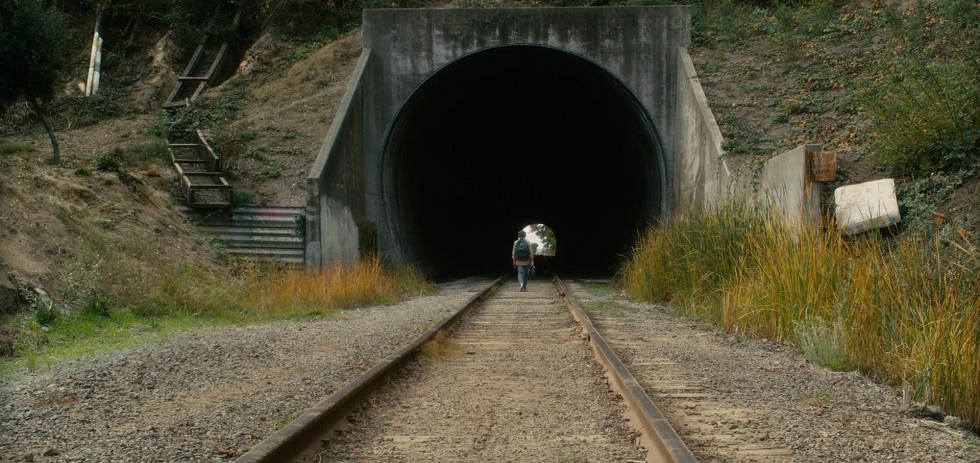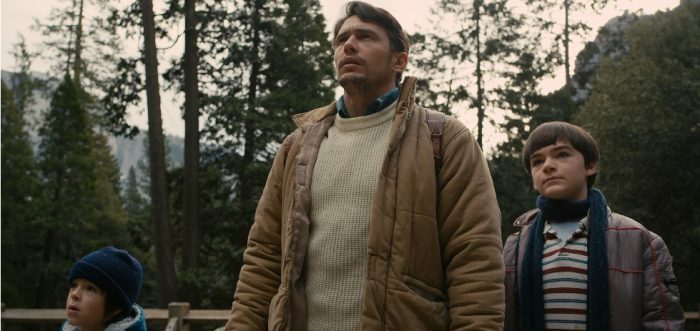
Gia Coppola’s 2013 film Palo Alto was the first to adapt James Franco’s collection of short stories, offering a snapshot of the lives of several well-heeled teenagers in the South Bay suburb where Franco grew up. Franco had stated his intention to use his stories as opportunities for young filmmakers, so his choice of a member of the Coppola film dynasty as director1 seemed oddly unrepresentative of the typical film school graduate, who would be struggling against anonymity to get their first feature made. The director at the helm of Yosemite, however, is Franco’s NYU classmate Gabrielle Demeestere, and hence somebody closer to the mark. Her feature debut2 serves as a prequel of sorts to Palo Alto — while Coppola’s film was interested in the destructive and creative impulses of adolescence, Demeestere’s is a study of the emotional landscapes of childhood.
The film takes us into the lives of three fifth-grade classmates, again in Palo Alto, circa 1985. On the verge of the dot-com boom, the sprawling suburb has so encroached on the natural environment that a rogue mountain lion has wandered into its streets in search of food and water. Demeestere uses a tripartite structure, with the first two sections deriving from Franco’s stories (“Yosemite” from his Palo Alto collection, “Peter Parker” from A California Childhood) and the third being Demeestere’s own contribution. The first segment opens as Chris (Everett Meckler) and his brother Alex (Troy Tinnirello) travel to Yosemite with their father Phil (Franco), a recovering alcoholic who has separated from their mother. While Phil tries to create a memorable experience for his sons, things take a turn when they lose their way and come across a burning carcass. The second part focuses on Joe (newcomer Alec Mansky), a boy who has been left in the care of his inattentive sitter while his mother attends a conference. Joe befriends a shiftless twenty-something man (Henry Hopper) who shares his love of comics, and whose motivations are troublingly ambiguous. The final part centres on Ted (Calum John), another boy whose concern for his missing tabby cat serves as a constant reminder of the much larger feline roaming the area. This section also brings the three boys together, as they procure a gun and set out in search of said mountain lion.
The images of the boys setting off together down the railway tracks, and the device of the borrowed gun, are strongly reminiscent of Yosemite’s eighties antecedent Stand by Me. Unlike Rob Reiner’s classic depiction of childhood, Demeestere’s film eschews any obvious trajectory from innocence to experience. Largely unconcerned with the imperatives of narrative, it is content to meander and to leave its ambiguities unresolved. Because of this, the film may strike some as vague, uneventful, or a pale comparison to Reiner’s entertaining classic, but as much as the film is small on plot arcs, it is big on atmospherics. The three parts are united by a pervasive sense of tension and dread, and are replete with physical manifestations of a threatening feeling – the unidentifiable carcass at the park, Joe’s potentially predatory friend, the mountain lion in the suburb. It is clear, however, that it actually has more to do with the boys’ personal problems than the world around them. Though young, they are already grappling with the realities of a careless world; epitomised, for example, by the alcoholism of Chris’s father, and the recent death of Joe’s younger brother.

Still, such significant problems remain largely on the periphery of the film. Shot through the lens of childhood, the concerns placed front and centre are those that have an all-consuming immediacy for the boys: the private moments of hurt, elation, or embarrassment that stem from their day-to-day encounters. This child-like distortion of events is brought out in the transitions between social and private space, through which the boys are variously cast in the light of their better or baser selves. The viewer first meets Ted, for instance, when he is cruel to Joe at school, but when Ted’s perspective is taken up in the final section, we find that he frets about Joe, who was actually his friend, and that he is only acting out against Joe’s recent withdrawal. Chris, by contrast, uses his private moment of prayer to wish away the little brother who has gotten him into trouble with their father. Such intimate moments emerge as tender and truthful rather than strange, and are testament to Demeestere’s ability to handle her subject matter with gentleness and subtlety.
This tendency towards subtlety or understatement is apparent in Yosemite’s construction as a period piece, for it largely avoids the visual clichés of eighties bad taste. One exception to this is the opening credit sequence, which recreates the appearance of a primitive computer game. Along with the green monochrome monitor through which Ted’s insomniac father accesses an early iteration of the internet chat room, this sequence is the only real intimation of the changing landscape of Palo Alto. While appealing in its own right, the sequence seems incongruous with the otherwise realist aesthetic of the film.
A sense of subtlety also characterises the performances. Franco is excellent and unobtrusive as an absent, insecure father, who craves a parental reverence from his sons that he simply has not earned, and Hopper skillfully inhabits the ambiguities of his role, somehow remaining endearing despite his potentially sinister intentions. The film’s true strength, however, comes from the performances of the young boys, and though the difficulty of working with children has become a platitude of the industry, Demeestere draws excellent performances from all three. Alec Mansky is particularly affecting as the lonely and sensitive Joe. He has the curious mix of vulnerability and defiance that characterised Truffaut’s The 400 Blows protagonist Antoine Doinel.3
James Franco undoubtedly has his detractors, and a second adaptation of his stories featuring the actor himself might be too much for some people’s tastes. Let’s give this insistent overachiever credit where it is due, though — Yosemite is a small but touching film, and has given voice to a new and interesting talent in Gabrielle Demeestere.
